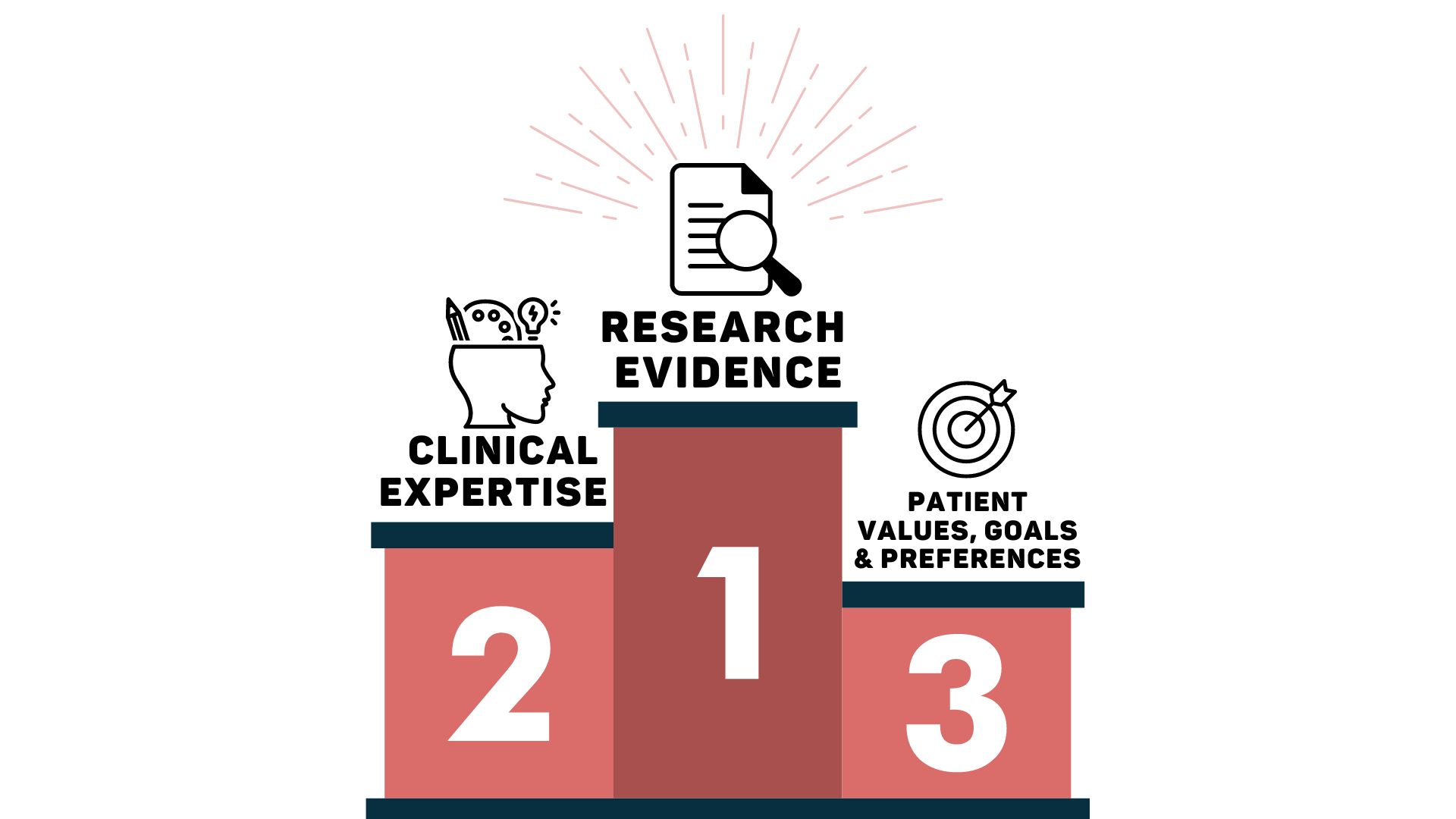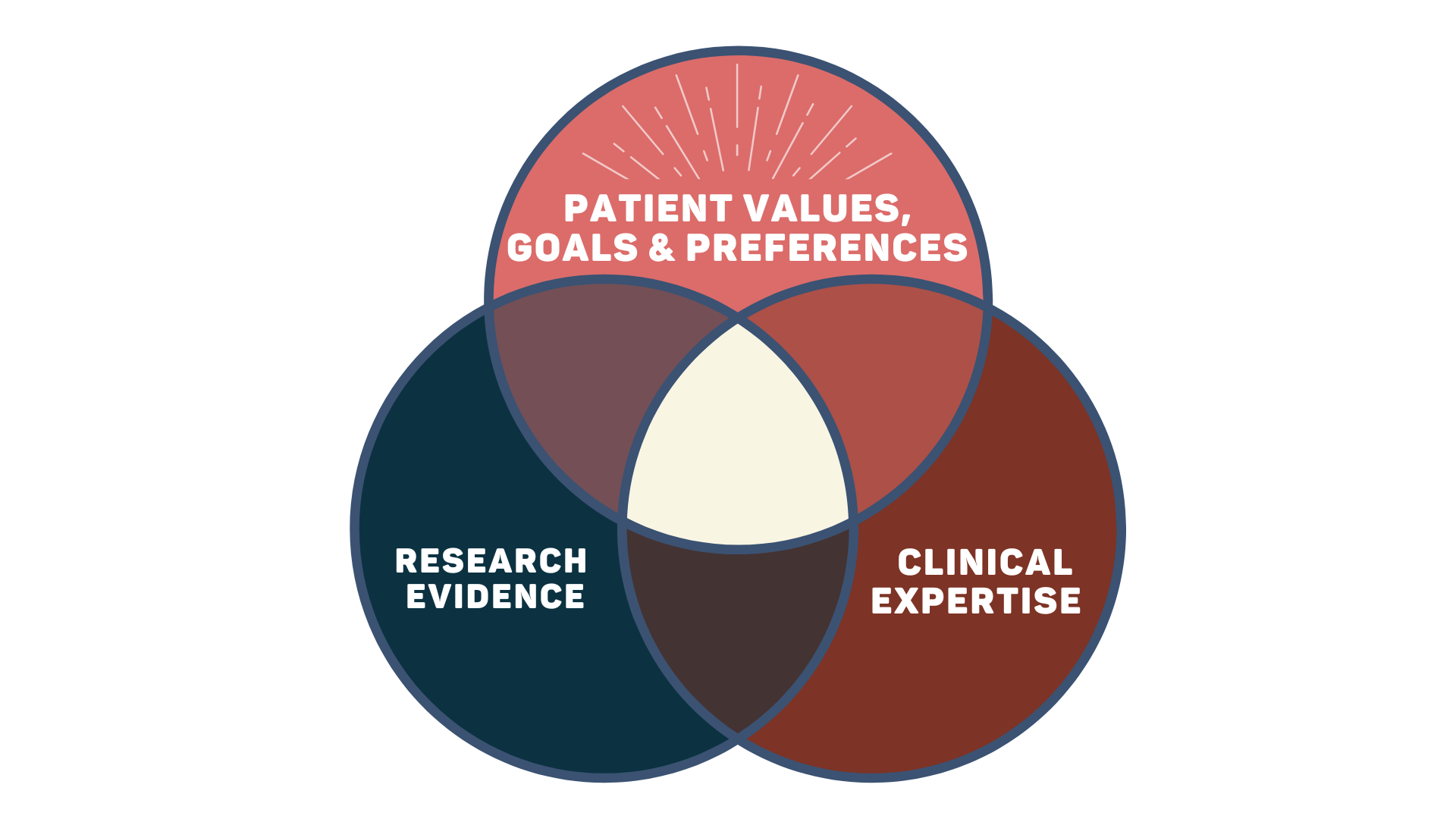If you are like me, it might be a bit of anxiety…When I am going to find the time to search the literature for an answer to my question? What if I can’t access the papers I am seeking? But I can only find “low quality” evidence! Am I interpreting these findings correctly? What does this mean for the clinical care that I provide?
Well, good news…when it comes to RESEARCH evidence, you have come to the right place. Being a group of interprofessional healthcare nerds that don’t mind digging into the literature and breaking it down. So send those questions our way and let us do some of the work for you. Check out our Blog posts and follow us on Social Media to get our take on the literature!
BUT, let’s also remember that RESEARCH evidence is important but NOT THE BOTTOM LINE when it comes to Evidence-Based Practice.
The three pillars of evidence-based practice (EBP) in healthcare were originally developed by David Sackett and his colleagues. David Sackett, a Canadian physician, is often considered one of the pioneers of EBP. The three pillars of EBP that he identified are:
1. Best Available Evidence: This pillar highlights the need to incorporate the best available scientific evidence from research studies and clinical trials into clinical decision-making. It encourages healthcare practitioners to stay current with the latest research findings.
2. Clinical Expertise: This pillar emphasizes the importance of healthcare professionals' clinical experience, judgment, and reasoning in making decisions about patient care.
3. Patient Values, Goals and Preferences: This pillar emphasizes the importance of considering and respecting the values, preferences, and individual circumstances of patients when making clinical decisions. It recognizes that patient-centered care involves shared decision-making between healthcare providers and patients.
Despite there being 3 pillars of equal weight put forth, the rub is that implementation in Canadian Healthcare has looked a little more like this…

Here are some of the consequences of our tendency to be biased towards research evidence and clinical expertise…
We feel stuck when a unique individual with a unique context doesn’t respond to the treatment approach that 12 RCTS and 2 systematic reviews say that they “should” respond to.
- Burnout
- Power dynamics are accentuated
- Client’s feel unheard, unseen and unhelped
- Medical trauma
- Crappy healthcare
- An overtaxed healthcare system
At AMP Healthcare Education, we believe in applying all 3 pillars to practice in a way that looks a little more like this…

Okay, so we might be a little bias towards the underdog. That is because we are seeing the significant consequences of brushing it aside. In order to provide quality healthcare, we need to prioritize connection. This requires that we elevate the value we place not only on an individual’s values, goals, and preferences, but also on their EXPERTISE in their lived experience. It also requires that we build skills to be present, promote autonomy, and develop a strong therapeutic alliance with the people that we are working with.
Our clinical expertise also matters. It is useful to have high yield skills and treatment options that we can draw on. But perhaps what matters more is HOW our clinical expertise is packaged and delivered to our clients. “Shoulds” and prescriptions doled out with an expectation that they be followed and not questioned leads to…
- Patient blaming (“they are non-compliant”)
- Patient shaming (“it didn’t work for me, they said it would, their must be something wrong with me.”)
- Dehumanizing health care experiences and alienation (“they won’t listen to me and don’t get it, why would I go back?)
- Unmet needs
When treatments and protocols are researched and presented as “the fix” it also means that we are applying our clinical expertise from a lens of “I am the expert, I have the answers, and I will resolve the issue.” How much pressure does that put on us to have all of the answers? Burn out anyone?
Acknowledging and leaning into the ever present clinical uncertainty that exists in everything that we do takes the pressure off. This is where the research and our expertise needs to intersect with our client’s preference, values, goals and expertise. When we apply our expertise from the stance of “I am your partner, I want to understand your experience, what matters to you? Let’s experiment together,” we are much more effectively positioned to offer insights and options, coaching our clients towards experiencing meaningful progress towards their goals while leaving them firmly in the driver’s seat of their care.
At AMP, we are committed to hosting and creating professional development experience that help you integrate and apply ALL 3 pillars to build your evidence based practice!
Lara Desrosiers OT Reg. (Ont.)
Director & Occupational Therapy Educator


